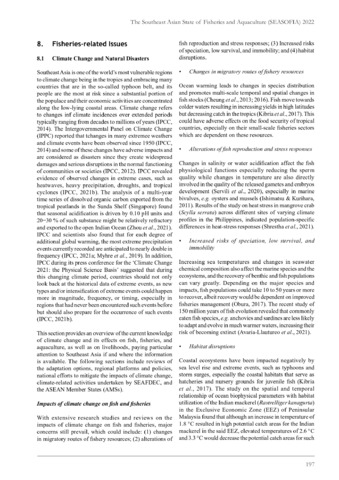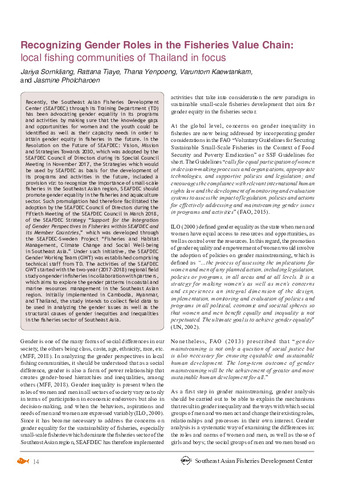Resiliency of small-holder fishfarmers to climate change and market prices in selected communities in the Philippines
Share
| dc.contributor.author | Agbayani, Renato F. | |
| dc.contributor.author | Baticados, Didi B. | |
| dc.contributor.author | Quinitio, Emilia T. | |
| dc.contributor.author | Tormon-West, Dianne H. | |
| dc.contributor.editor | Bondad-Reantaso, Melba G. | |
| dc.contributor.editor | Subasinghe, Rohana P. | |
| dc.date.accessioned | 2015-05-05T07:27:18Z | |
| dc.date.available | 2015-05-05T07:27:18Z | |
| dc.date.issued | 2013 | |
| dc.identifier.citation | Agbayani, R. F., Baticados, D. B., Quinitio, E. T., & Tormon-West, D. H. (2013). Resiliency of small-holder fishfarmers to climate change and market prices in selected communities in the Philippines. In M. G. Bondad-Reantaso & R. P. Subasinghe (Eds.), Enhancing the contribution of small-scale aquaculture to food security, poverty alleviation and socioeconomic development (FAO Fisheries and Aquaculture Proceedings No. 31) (pp. 171-179). Rome: FAO. | en |
| dc.identifier.isbn | 9789251079611 | |
| dc.identifier.uri | http://hdl.handle.net/10862/2212 | |
| dc.description.abstract | A rapid assessment of the resiliency of small-holder fishfarmers in selected communities in the Philippines was conducted to gather the fishfarmers’ observations and insights about climate change and market prices, and the impacts of climate change on their environment, livelihood and life, in general, and to learn measures they have adopted to cope with adverse situations. The study sites were communities that were undertaking aquaculture livelihood, with technical support from the Aquaculture Department of the Southeast Asian Fisheries Development Centre or SEAFDEC/AQD and logistical assistance from their local governments and international and private donors. The climate change phenomena observed in the study sites were flash floods, sea level rises, increases in temperature, stronger waves, and longer dry season (drought). The major ecological impacts were mortality of marine flora and fauna, destruction of aquaculture facilities (cages and ponds), disruption of aquaculture protocol, and frequent occurrence of fish diseases. As a result, fishfarmers suffered substantial financial losses that forced them to either borrow more money (most are already heavily indebted), or stop operation until financial support is available. To help each other survive common hardships, the fishfarmers resorted to the Philippine traditional “bayanihan” system or collective action for their common good. Rapid assessment studies can only provide initial insights on the situation in the community. A more comprehensive and integrated methodology to include various dimensions (human, ecological, economic, technological and institutional) is recommended in future studies on climate change. | en |
| dc.language.iso | en | en |
| dc.publisher | FAO | en |
| dc.relation.ispartofseries | FAO fisheries and aquaculture proceedings; 31 | |
| dc.relation.uri | http://www.fao.org/3/i3118e/i3118e.pdf#page=189 | |
| dc.subject | Resiliency | en |
| dc.subject | Small-holder fishfarmer | en |
| dc.subject | Rapid assessment | en |
| dc.subject | Local government | en |
| dc.subject | Fisheries development | en |
| dc.title | Resiliency of small-holder fishfarmers to climate change and market prices in selected communities in the Philippines | en |
| dc.type | Conference paper | en |
| dc.citation.spage | 171 | |
| dc.citation.epage | 179 | |
| dc.subject.asfa | Climatic changes | en |
| dc.subject.asfa | aquaculture | en |
| dc.subject.asfa | costs | en |
| dc.subject.asfa | marketing | en |
| dc.subject.asfa | Governments | en |
| dc.subject.asfa | climate | en |
| dc.subject.asfa | flooding | en |
| dc.citation.conferenceTitle | Enhancing the contribution of small-scale aquaculture to food security, poverty alleviation and socioeconomic development | en |
Files in this item
| Files | ขนาด | รูป | View |
|---|---|---|---|
| 2212-AgbayaniRF2013.pdf | 171.9Kb | application/pdf | ดู/ |
รายการนี้ปรากฏใน (s)
-
AQD Conference Proceedings [300]
These papers were contributed by AQD staff to various national and international Conferences




